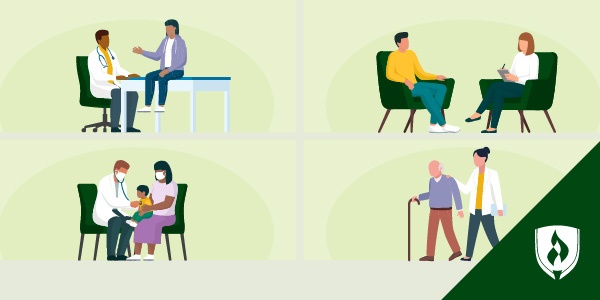6 Signs It's Time to Expand Your Nursing Practice (Without Starting a New Degree)
By Brianna Flavin on 08/15/2023

By the time you’ve worked through the experience and education it takes to earn your Master of Science in Nursing (MSN) or to become a nurse practitioner—you’ve logged some serious hours and built advanced knowledge in your area.
If your career path has also involved an area of passion, gerontology or family practice for example, you might feel like it’s too late to change your focus. You don’t want to start all over. If you’ve been working as a nurse educator or in administration, you face a similar dilemma. How can you make changes to your career this far down the road?
The need for more career mobility in nursing
As you’ve probably seen, nurses tend to innovate. When needs pop up in healthcare or leadership or education, nurses step up to meet those needs. And institutions of higher learning or credentialing scramble to keep up.
If you made a list of where nurses are needed in healthcare, you’d have a hard time ever coming to the end of it. Mental health nursing has been a huge need for a long time, but since the pandemic, that demand has skyrocketed.
With a lack of clear mental health options, many patients will ask their primary care providers for help. This means nurses in a clinic setting might be the only professional a patient goes to for advice about anxiety or antidepressants. When that happens, nurses start wondering how they can expand their scope of practice—to be able to address both mental and physical health needs at once.
The mental health needs are high. And mental health nursing isn’t the only focus area needing more hands on deck.
We need nurses all over the place, and we need more options to give nurses. This is where new education options like post-graduate nursing certificates can help. These short programs allow you to add nurse practitioner specializations onto your existing graduate nursing credentials, or to start working as a clinical nurse again when you’ve been working in leadership or education.
Sound interesting? Read on to see if a post-graduate certificate program in nursing is the education option you’ve been waiting for.
6 Signs it's time for a post-graduate certificate program
1. You started with one niche area of focus, and you want a change
If you’ve been working in a very specialized area of nursing, you might well wonder if you can pivot at this point. If you've been working in gerontology or pediatrics, you might dream of being able to work with entire family units as a family practitioner.
Or maybe you get patients asking for certain things a lot and you’d like to be able to help them on top of the work you are already doing. A psychiatric mental health nurse might see a need to evaluate patients physically and be able to get them their blood pressure medications, for example.
2. You graduated your nursing program years ago, and it’s limiting your scope of practice
If you gained your title years ago, you might now see newer graduate certifications that offer a wider scope of practice in the hands of nurses who do exactly the same things you’ve been doing for ages.
Take mental health nursing for example. There are older credentials like 'clinical nurse specialist,' nurses might hold as they've advanced to working as a therapist. These nurse therapists might not have the authority to prescribe medication like newer graduates in the same vein of work.
Nurses like this can pursue a Post-Graduate Certificate in a Psychiatric-Mental Health Nurse Practitioner specialization without starting over in an advanced degree. Nurses who come into the post-graduate programs can take specialized courses for the specific work they want to do.
3. You work in a rural area with limited options for patients
Finding the right health professionals can be tricky enough wherever patients live. But in rural areas, finding psychiatric-mental health care and even primary medical care can become a massive barrier.
Some patients need to cover massive distances to get to a mental health nurse, and then cover even more ground in another direction to get their cholesterol medications filled. Since every person has both mental and physical health needs, nurses who add specializations to their skillset can meet more needs in one place.
In an ideal situation, one location could house psychiatric-mental health, medical and all other health professionals for a better patient experience. But when the situation isn't ideal, nurses and other health professionals can still add to their scope of practice.
4. You’re in education or leadership and you want to become an advanced practice clinician
If you earned a Master of Science in Nursing and went into nursing administration or education, you might be wondering how much more training you’d need to work as an advanced practice nurse. There’s something about working at those high levels of leadership that gives you a macro view of the needs in the healthcare system.
Maybe you've been guiding nursing students through clinicals for a while, and you keep wondering about jumping into those environments yourself. Nurses are so short staffed everywhere, it's tempting to wonder if a shift into advanced practiced nursing might be the perfect move right now.
5. Your current role is driving you toward burnout
The deeper you go into nursing, the more you see. Nurses really do see some aggravating and infuriating problems. This can be a powerful motivation to scale your credentials and gain more power to attack those problems.
One important part of career mobility is to avoid nursing burnout. If you feel trapped in your role, frustrated most of your work day and are even starting to feel bitter toward your patients, going for a post graduate nursing certificate can give you a way out of your current job and remember what you loved about nursing.
Nursing is full of possibilities, and having a good option to access those possibilities can make all the difference.
6. You want to fill gaps for a safer patient experience
The segmentation of different parts of healthcare make sense from a career and training angle. It would take someone many lifetimes to learn everything patients need. But when you are a patient, having different providers and facilities as silos of knowledge can become a logistical nightmare.
Consider in-patient psychiatric units. If you are working as a mental health nurse, you quickly realize that every patient who comes in also has primary care needs--sometimes very pressing primary care needs. Patients needing psychiatric support might also have infections or injuries they've ignored because of their mental health crisis. Someone struggling with substance abuse could arrive at an in-patient psych facility and start crashing or detoxing their very first night.
If nurses are working in a specialized mental health facility, they might not have staff who can treat or asses these other medical issues. This means patients have to relocate to an emergency room, wait there for hours to navigate the admissions process, then come back to start their psychiatric care once they've met the medical need.
Transit is a safety problem for patients who are already dealing with mental illness. If one provider could help patients with both their medical and mental health issues, that would make a huge difference for patients. It would also give the mental health provider a chance to build more rapport.
Change nursing lanes with a post-graduate nursing certificate
Whether you want to get into a new nursing focus or increase your impact in your current role, these post-graduate certificate nursing programs were designed to give you the skills you need for career mobility.
If you’ve seen the rise in mental illness and want to get into psychiatric-mental health nursing, or if you’ve been working in nursing education and want to get into advanced practice nursing—or if any of the above situations describe you, maybe these programs are just what you need.
Post-graduate certificate programs in nursing offer many different specialty areas to choose from. Take a look at your options at Rasmussen University's Nursing Post-Graduate Certificate Program page.
Relevant Articles:
Currently, these programs are not eligible for Title IV federal student aid programs. These programs are not available in all states.




